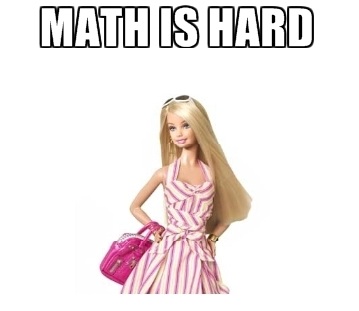 The thing is, this is actually true — for all genders.
The thing is, this is actually true — for all genders.
The problem:
The 21st century rewards those who can think mathematically, but the human brain isn't built to do that.
A new kind of school can train students — all students — to understand math, all the way from 4+5=9 to statistics and calculus. Our goal is nothing less than that. And there's good evidence that this isn't just a utopian wish.
But before we continue with the optimistic thinking, we have to make something perfectly clear:
Math is unnatural. Math is hard.
Sure, there are a few rare humans who apprehend new mathematical ideas as readily as the majority of us apprehend the plots of, say, Michael Bay movies. Those people face entirely different problems in math class — we'll ignore them for right now.
For the grand majority of us, learning math is difficult. Vexing. Boring.
We shouldn't be surprised by this — the human mind wasn't designed to do complex, abstract math. Being able to solve for x wasn't of particular use on the African savannah.
In contrast, the human mind was designed for learning a different abstract, rule-based, and knowledge-heavy system: language. Each human language has a syntax and vocabulary that is far more complex than the sum total of everything we ask students to learn in K-12 math.
Yet every virtually every 6-year-old speaks their local dialect flawlessly, while few 18-year-olds have mastered math.
We're built for language. We're not built for math.
Maybe there's some species out there who can do complex math automatically — but it ain't us.
We need to face this reality — until we do, we'll underestimate the difficulty of math learning, and sell kids short. From this dismal starting point comes the outline of a plan:
We need to make learning math easy.
Once we understand how alien math learning is, and yet how crucial it is to success in the 21st century, we're left with the resolve to re-invent math learning so every student can succeed.
This is already being done. We can piggyback on it, and make it even better.
By understanding how human cognition works, we can lead all students to learn math, and learn it well. We can help people succeed. We can have a better world.
We should be able to promise a few things about math to every student who comes into our school:
1. They will be active learners, not passive receivers. 2. They will be led to fully understand every concept in the curriculum. 3. They will be adept at solving every mathematical problem they encounter. 4. They will easily remember everything they learn, all the way up until they graduate.
In the next post, I'll sketch out how.
(A note: I'm worried about two things in this post. First, that what I've just sketched out will seem too optimistic. Is it really true that all kids — even those who aren't predisposed to math — can master calculus? There's excellent evidence that, excepting students with interesting neurological difficulties, the answer is yes. Second, I'm terrified that I've wrongly conveyed the sense that math can't be enjoyable. This would be horrible, as I love math: love teaching it and learning it for myself. The joy of fully grokking a math concept is one of the sweetest pleasures I know. Hopefully I'll be able to explain how we'll bring the love of math into our school in a future post.)